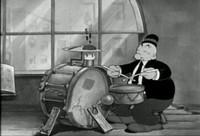We’re all for comfortable footwear, but we really don’t get the whole “Crocs” thing. They again, we’ve never tried them on, so perhaps we’re not being fair. They look like good shoes for space pirates or RNs and we are neither (sadly).
consumerism

Dumpster Diving To Prosperity
Dumpster diving is the epitome of equal opportunity consumerism, best showcased by colleges during the bountiful, if not lucrative, weekend after graduation. The Times examined the seedy underbelly of capitalism through the lens of the freegans, who provide an unappetizing but compelling example to price-conscious consumers.
Freegans are scavengers of the developed world, living off consumer waste in an effort to minimize their support of corporations and their impact on the planet, and to distance themselves from what they see as out-of-control consumerism. They forage through supermarket trash and eat the slightly bruised produce or just-expired canned goods that are routinely thrown out, and negotiate gifts of surplus food from sympathetic stores and restaurants.
Finding furniture on the street is one thing, but we draw the line at consumables. What are your experiences and thoughts on dumpster diving? Tell us in the comments. — CAREY GREENBERG-BERGER

A Song For You: "We Like Having These Things," by Numbers
Happy Friday, here’s a song we found on the internet that felt very fitting for our readers put in their iPod, “We Like Having These Things,” a jagged post-punk paean to consumerism, by the band Numbers.

Forty-Three Tips For Earth Day
Senator Gaylord Nelson started Earth Day way back in 1970 as a political movement to demonstrate popular support for environmental regulation. Thirty-seven years later, Earth Day is not only a day of political reflection, but a reminder of your power as a consumer.

Brain Scans Predict If You’ll Buy Something
- When people see something they want to purchase, a portion of the brain called the nucleus accumbens “lights up” on a brain scan. If the price is too high, another region of the brain called the insula is activated and the mesial prefrontal cortex (MPFC) is deactivated, Dr. Brian Knutson of Stanford University in California and colleagues report.

Walmart Predicts Flat Sales In November
Walmart dampened our holiday spirit today with a forecast of flat sales throughout November at stores open longer than one year. What’s the problem?
Binge Shopping: Men And Women Equally Lack Self-Control
Men, cease your superiority, your smug commentary on why women need to buy so many pairs of shoes to get in the kitchen and make you dinner. As a sex, they may very well be inscrutable, but it turns out that we’re all shopaholics on the first x chromosome.
Consumerist On Nightline
Here’s the video of us on Nightline along with Vincent Ferrari this past Friday, July 14th. People seem to enjoy the part where we say “So?” We like it when Vincent says “Vent their spleen!” Though we really wished they included our metaphor about crack rocks. Nightline definitely nails the best rendering of the cancel call we’ve seen. They re-edited the recording to leave in the juicy bits, then present the transcript with snazzy bubbles.
Do You Feel Lucky? Well, Punk, Do Ya?
After practically inventing the handgun market with the Smith & Wesson .357, the firearms company found itself losing market share in recent years. To regain prominence, S&W set its sights on the basic underlying principle of American consumerism: bigger everything.
The Eternal Struggle Between Politics, Companies & Consumers
This video is probably an excellent look in microcosm of the eternal struggle between politicians (USC Vice President Ryan Holt), companies (symbolized by the balloons) and consumers (represented by the sniggering prankster). A number of observations can be gleaned from watching one of our nation’s fat cats in fetal form foam at the mouth over a room full of balloons.
The Benzene Scare In Perspective
The sexiest gastronomists on the web over at Accidental Hedonist have an excellent post up putting the entire benzene in soda scare in perspective.
Mankind Tapes Itself Shopping
We went YouTube cruising for shopping videos. In this one, an African-American girl goes shopping for Saturday night clothes while her male co-workers tapes and his friends make slightly derogatory comments.

Behavioral Economics: The Science of Bad Buys
Yesterday, we asked the question whether or not the bad choices of the consumer aggregate proved that there was no free will, or just proved that pretty much everyone’s stupider than us. And, in that vein, Harvard Magazine as an interesting overview on behavioral economics and the theories on why people make logically moronic consumer choices.
Mind Hacks Asks “Is There A Science To Advertising?”
One of my favorite neuroscience blogs, Mind Hacks, is posing an open question on the nature of advertising to their readers. They are looking to fill next month with posts examining whether or not advertising is a science and the psychological implications and effects it has on the clump of electrically-charged gray noodles coagulating in our heads.

Consumerist Contamination of Ghana
Over at the New York Times, Princeton philosopher Kwame Anthony Appiah has written an extremely thoughtful look on the cultural and consumerist “contamination” of traditional Ghanaian life. There’s so many good quotes in it, we could just go nuts with the blockquote tags, but overall, it is a remarkably fair piece on the recent influx of Western media and products into a largely agrarian, tribal African country; a piece on contamination, unlike most, that doesn’t sneer at third-world consumers as unthinking automatons too ignorant and unworldly to see their kente cloths as more “authentic” than imported Levis, but people who make cultural and consumerist choices based upon their own free desires, and who should be encouraged to continue doing so as the drivers of their own cultural destiny.





Monday Morning Reminder: Consumerist Wants Your Tips
Just a reminder that if you’ve found a story you’d like to see here, have an anecdote (bad or good) about a company or just want to give feedback about the tone and direction of this site, The Consumerist wants to hear from you.